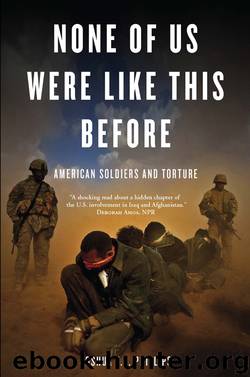None of Us Were Like This Before by Joshua E. S. Phillips

Author:Joshua E. S. Phillips
Language: eng
Format: epub
Tags: None of Us were Like this Before: American Soldiers and Torture
ISBN: 9781844679294
Publisher: Verso Books
Published: 2011-04-21T04:00:00+00:00
Chapter 7:
Silent Suffering
AFTER SWEATING OUT eleven months of armed service from April 2003–March 2004, the soldiers of Battalion 1-68 rotated back home. They departed the white hot plains of the Iraqi landscape, returning to the coarse, arid buffs surrounding Fort Carson, Colorado. From there, various members of Battalion 1-68 either headed home or signed up for further military service. Sergeant Oral Lindsey hoped to join the Cavalry Scouts and attend sniper school, but the Army couldn’t find a slot for him and so he retired. Daniel Keller went back to California and eventually attended college in San Diego. Jonathan Millantz said he was suffering from debilitating post-traumatic stress disorder and applied for a medical discharge. The military approved it, and he soon returned home to Greensburg, Pennsylvania. After Adam Gray visited his family in Wisconsin and California, he traveled to Fort Wainwright, Alaska, where he underwent training to operate new armored vehicles known as Strykers.
Though they were far from the violence of the Sunni Triangle, many of Battalion 1-68’s soldiers struggled with their return home. Tony Sandoval drank heavily. He also gained weight, his high blood pressure shot up, and a low-level depression ate away at him.
“My stress was incredibly high,” remembered Sandoval. “Things weren’t funny, sweets weren’t sweet any more.”
Like other veterans I met, Sandoval also struggled to overcome the defensive impulses he developed in Iraq. Troops called it “hypervigilance,” and it was tough to turn it off after they returned home. It was unnerving to hear Fourth of July fireworks because they reminded the vets of exploding bombs. It was even hard to adapt to driving in the US. In Iraq, troops dodged attacks and IEDs when they drove out on patrol. Back home, veterans told me how they recoiled when their vehicles hit a pothole, became edgy whenever they were stuck in traffic, and had difficulty controlling the impulse to drive aggressively. They were often anxious in large crowds, and many of them suffered from nightmares and insomnia.
For Keller, that pattern of behavior evoked familiar images of “Vietnam vets on TV … waking up and sweating and screaming. They went through much more intense stuff than I did. But a lot of the guys I’ve talked to … share one commonality of not being able to sleep.”
Some abused drugs and alcohol, in what they called “self-medicating.”
“I drank a hell of a lot, absurd amounts,” Keller recalled. “It’s not like you go to the bar and get drunk and puke…frat boy kind of stuff, which is bad enough on its own. You drink and you drink and you drink, and all of a sudden you think about putting yourself out by drinking. That’s the self-medication I was doing—when you actually try to drink yourself to death.”
Keller, like other veterans, also struggled to control his anger.
“I had to actually actively control myself if I felt my temper rising,” he said. “I had to kind of hold myself back, and sometimes people would have to physically hold me back.”
Adam Stevenson could relate to that kind of hypervigilance.
Download
This site does not store any files on its server. We only index and link to content provided by other sites. Please contact the content providers to delete copyright contents if any and email us, we'll remove relevant links or contents immediately.
The Vikings: Conquering England, France, and Ireland by Wernick Robert(77393)
Ali Pasha, Lion of Ioannina by Eugenia Russell & Eugenia Russell(39334)
The Vikings: Discoverers of a New World by Wernick Robert(36491)
Cecilia; Or, Memoirs of an Heiress — Volume 1 by Fanny Burney(31353)
Cecilia; Or, Memoirs of an Heiress — Volume 3 by Fanny Burney(30951)
Cecilia; Or, Memoirs of an Heiress — Volume 2 by Fanny Burney(30908)
The Conquerors (The Winning of America Series Book 3) by Eckert Allan W(28067)
Empire of the Sikhs by Patwant Singh(22186)
Hans Sturm: A Soldier's Odyssey on the Eastern Front by Gordon Williamson(16814)
The Secret History by Donna Tartt(16667)
Cat's cradle by Kurt Vonnegut(13898)
Sapiens: A Brief History of Humankind by Yuval Noah Harari(13080)
Pimp by Iceberg Slim(12949)
Leonardo da Vinci by Walter Isaacson(11923)
Talking to Strangers by Malcolm Gladwell(11909)
Norse Mythology by Gaiman Neil(11903)
Underground: A Human History of the Worlds Beneath Our Feet by Will Hunt(11266)
4 3 2 1: A Novel by Paul Auster(11078)
The Radium Girls by Kate Moore(10921)
